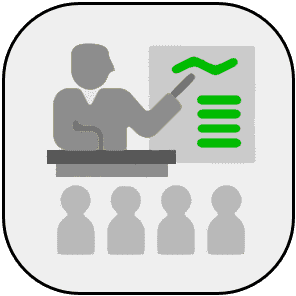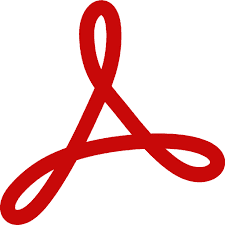What is Tacit Knowledge?
Tacit Knowledge is one of two categories of knowledge.
The other is: Explicit Knowledge. While explicit knowledge is relatively
easy to capture and code in organizations, this is much more difficult with
tacit knowledge. As a result, most organizations have concentrated their
knowledge management efforts on developing explicit
knowledge.
However, tacit knowledge is generally the more important category,
because it is often a source of the
Core Competence and the
Competitive Advantage
of any corporation. As a competitive advantage, it is sustainable, because
it is so hard to copy or imitate. Furthermore it is crucial for
making the right business decisions and also for innovation.
From a financial perspective it is an important part of the
Intangible Assets of any
firm.
The term "tacit knowing" was coined by scientist and philosopher
Michael Polanyi. It is important to note that he actually described
a process (hence: tacit knowing), and not a form
of knowledge.
One way of viewing tacit knowledge is to see it as the glue
that is binding the explicit knowledge together. Another way to describe it,
is as “know-how”, as opposed to: “know-what” (facts), or “know-why”
(science). Another way is to make distinction between embodied knowledge
and theoretical knowledge. On this account, knowing-how or embodied knowledge
is characteristic of the expert, who acts, makes judgments, and so forth without
explicitly reflecting on the principles or rules involved. The expert works
without having a theory of his or her work; he or she just performs skillfully
without deliberation or focused attention. Knowing-what and knowing-why, by
contrast, involve consciously accessible knowledge that can be articulated
and is characteristic of the person learning a skill through explicit instruction,
recitation of rules, attention to his or her movements, etc. While such declarative
knowledge may be needed for the acquisition of skills, the argument goes,
it no longer becomes necessary for the practice of those skills once the novice
becomes an expert in exercising them, and indeed it does seem to be the case
that, as Polanyi argued, when we acquire a skill, we acquire a corresponding
understanding that defies articulation.
Tacit Knowledge is difficult to codify, document, communicate,
describe, replicate or imitate, because it is the result of human experience
and human senses. The skills of a master or of a top manager cannot be learned
from a textbook or even in a class, but only through years of experience and
apprenticeship.
Nonaka and Takeuchi
describe tacit knowledge as a non-linguistic, non-numerical form of knowledge
that is highly personal and context specific and deeply rooted in individual
experiences, ideas, values and emotions. Furthermore, they distinguish between
technical tacit knowledge, meaning skills or concrete "know-how", and
cognitive tacit knowledge, which refers to ingrained schema, beliefs,
and mental models that are taken for granted.
P. Baumard (Tacit Knowledge in Organizations, 1999) has argued
that knowledge in general, and tacit knowledge in particular, can be both
an attribute of individuals and of groups, collectives or organizations. Although
organizational tacit knowledge may be somewhat different from individual
tacit knowledge. See also:
Bridging Epistemologies
Hildreth and Kimble (The duality of knowledge, 2002) argue
that the common approach to try to convert tacit knowledge to explicit
knowledge, and then handle it using the 'traditional' approach is flawed.
Some knowledge simply cannot be captured. A method is needed which recognizes
that knowledge resides in people: not in machines or documents. They argue
that knowledge management is essentially about people and the earlier technology
driven approaches, which failed to consider this, were bound to be limited
in their success. They suggest as practical way forward to use Communities
of Practice, which provide an environment for people to develop knowledge
through interaction with others in an environment where knowledge is created
nurtured and sustained. Other systems via which organizations try to develop
or capture tacit knowledge include special portals, search engines, resident
experts, and documentation systems for experts.
|
Forum about Tacit Knowledge.

|
Recording Tacit Knowledge
A skill matrix is useful for recording employees knowledge bank on subject matters. When required, it can be like a library to seek out an "expert" on a subject within the organization. This is partic...
 11  7 comments |

|
How to Learn Tacit Management Skills
The best way to learn good tacit management skills is to have the student learn by copying and observing a good manager (mentor) managing. In this way, a developing astute student manager will display...
 9  6 comments |

|
Know How, Know What and Know When
Tacit knowledge is an essential part of the "profound knowledge" as referred by Deming. It let us manage "know how" with "know what" and "know when".
If your know "what" you can say that you have dia...
 8  1 comments |
|
🔥
|
Reusable Knowledge | Reuse of Knowledge
Knowledge Management can advance by moving from a two-fold (Tacit and Explicit) approach to a three-fold (Tacit, Explicit and Reusable Knowledge) one. This will improves the state of the entire effect...
 6 |

|
Indiginious Knowledge
This tacit knowledge is lke to indiginious knowledge. It should be nursed with high care. Any country or organization can progress by using its tacit knowledge, especially in education systems....
 6  1 comments |

|
Tacit Knowledge -- Grapevine
In an organisation, another useful source of knowledge is the "GRAPEVINE". It is defined as: the informal transmission of information, gossip, or rumor from person to person. It also means a usually u...
 5  1 comments |

|
Communities of Practice
I noticed an interesting article in the Harvard BR March 2010) providing some interesting thoughts on communities of practice. According to authors Richard McDermott and Douglas Archibald, communities...
 5 |

|
Using Tacit Knowledge for Organogram
If we can measure the knowledge of an employee then we can suitably post him in the hierarchy of the organization. Since the organogram (structure and restructure) of the organization is very difficul...
 4  1 comments |

|
How to Transfer Tacit Experience Globally
Along with Chinese companies going global comes the need to reducing ramp-up time and cutting costs during knowledge and experience transfer. Investing in new technologies and patents is one part of t...
 2 |

|
Tacit Knowledge in Business Management
Indeed tacit knowledge has not been given its due (what it deserves) in general management practise.
In an environment where there is inadequate availability of data, one way by which managers could...
 2  2 comments |
|
|
|
Courses about Tacit Knowledge.

Beginners Course
|

Advanced Course
|

Course for Experts
|
|
|
|
The best, top-rated topics about Tacit Knowledge. Here you will find the most valuable ideas and practical suggestions.
|
🥈
|
Reliance on Tacit Knowledge
Westerners seem to denigrate the role of tacit knowledge in job performance without objective justification. Thus, without objective justification, I will state that the power of communities of practi...
 10  29 comments
|
|
|
|
Advanced insights about Tacit Knowledge. Here you will find professional advices by experts.

Consultancy Tips
|

Teaching Tips
|

Practical Implementation Tips
|
|
|

|
Positive Effects of Age Diversity on Company Productivity and (Tacit) Knowledge Sharing Tacit Knowledge Transfer, Workforce Productivity, Incentive Management
Backes-Gellner and Veen (2013) outlined the main advantages of having a diverse workforce within a company. The followin...
|

|
How to Identify and Map Knowledge Knowledge Identification, Knowledge Capturing, Knowledge Storage
In his article “Knowledge Mapping: The Essentials for Success”, Wesley Vestal provides following six tips to identify an...
|

|
Capturing Learned Lessons How to Capture Organizational Learning? Best Practices
Knowledge from bad and good experiences will lead you and your organization to better future performance. You can improv...
|

|
Barriers that Hinder Effective Knowledge Sharing Effective Knowledge Sharing, Pitfalls to Avoid, Knowledge Management Implementation
According to Chris Collison, there are seven common barriers or syndromes that hinder effective knowledge sharing and se...
|

|
The N-Form Organization (Hedlund) Alternate KM Framework
Gunnar Hedlund of the Stockholm School of Economics introduced the notion of the N-Form corporation in 1994. He proposed...
|

|
Knowledge Management Scope Knowledge Management, Level of Know-how
Research by Deishin Lee (HBS) and Eric Van den Steen (MIT) shows that recording mediocre know-how can actually be counte...
|

|
Knowledge Management Focal Point Knowledge Management Focus
Research by Deishin Lee (HBS) and Eric Van den Steen (MIT) shows that information about successes is typically more usef...
|
|
|
|
Various sources of information regarding Tacit Knowledge. Here you will find powerpoints, videos, news, etc. to use in your own lectures and workshops.

|
People and Latent Knowledge in Organizational Learning Knowledge Creation, Explicit Knowledge, Tacit Knowledge
Knowledge management theory has struggled with the concept of knowledge creation. Since the seminal article of Nonaka in...
|

|
Revisiting Knowledge Management Integrating Knower with the Knowledge Processes
Very good paper by Madhukar Shukla gives historic overview of KM, 3 dimensions of KM and future directions of KM....
|

|
Knowledge Management and Organizational Learning Models, Implementation, Overview, Examples
An extensive presentation explaining both the concept of Knowledge Management and Organizational Learning by H. Gundogan...
|

|
How to Improve Knowledge Sharing in Knowledge-intensive Organizations Knowledge Management, Knowledge Sharing Motivation, Knowledge Sharing Platform. Tacit Knowledge
This presentation elaborates on the concept of knowledge sharing, thereby focusin on a knowledge-intensive organization ...
|

|
Overview of Existing Types of Knowledge Knowledge Management, Knowledge Types, Tacit, Implicit, Explicit, Declarative, Procedural Knowledge
This presentation provides an overview of the different types of knowledge that exist. The presentation includes the fol...
|

|
Knowledge Management Systems Architecture Knowledge Management, Knowledge Creation, Knowledge Systems, Knowledge Architecture
This presentation is about knowledge development and management, including the following sections:
1. Overview
2. Know...
|

|
Management Accounting of Intangible Assets Intangible Assets, Intellectual Capital Measurement
This presentation provides information about intangible assets and the effective management/accounting of these assets. ...
|

|
Leveraging Cognition for Competitive Advantage:A Knowledge-Based Strategy Process Knowledge-intensive firms
Article by Senthil K. Muthusamy and Ramaraj Palanisamy. One of the central bases for achieving competitive advantage is ...
|

|
Knowledge Sharing and Organizational Learning through Communities of Practices Knowledge Sharing, Organizational Learning, Communities of Practices, Special Interest Groups
Knowledge management in Communities of Practice (CoPs)
This presentation is about organizational learning and knowledge...
|

|
Introduction and Summary of SECI Initial Understanding of SECI. Start of workshop/training
Knowledge Management
Is utilizing tacit (the unseen huge part of the iceberg), as well as explicit (the tip of the iceb...
|

|
Introduction and Summary of Intangible Assets (IAS38) Initial Understanding of Intangible Assets, Accounting Treatment
Accounting treatment of intangible assets:
- Identifiable (seperable, legal right)
- Non-monetary Assets (non-cash)
-...
|

|
N-Form Organization Knowledge Management, Tacit Knowledge
The Dynamics of Knowledge Management in an N-Form Organization....
|

|
3 Pillars of KM Knowledge Management
Three Pillars of Knowledge Management (Wiig)....
|
|
|
|
Useful tools regarding Tacit Knowledge.

News
|

Videos
|

Presentations
|
| |

Books
|

Academic
|

More
|
|
|
|
Compare with: SECI model
| Bridging Epistemologies
| Johari Window
| Organizational Learning
| Organizational
Memory | Action
Learning |
Knowledge Management
(Collison & Parcell) |
Causal Ambiguity |
Analogical Strategic
Reasoning |
Bounded Rationality |
Synectics | Storytelling
|
|
|

